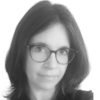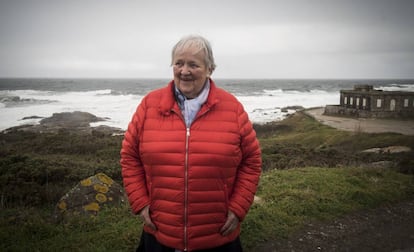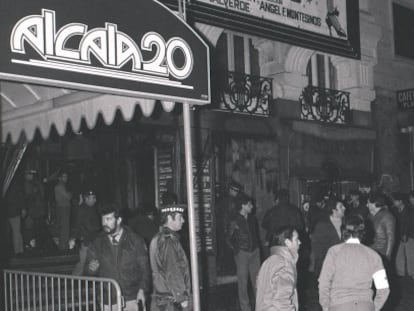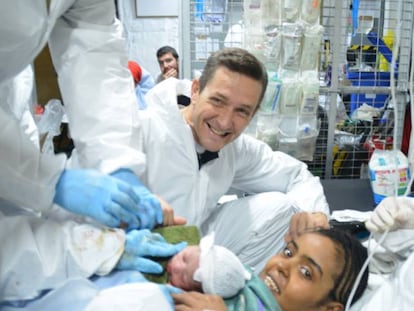Norwegian girl shipwrecked in Galicia returns 70 years later
Arnhild Utheim was 10 when she awoke on a Spanish beach after her entire family drowned in 1948


Galicia has a long history of shipwrecks, but even then, the story of Arnhild Utheim stands out in the collective memory. On December 31, 1948, a child was washed ashore on a beach in Cape Silleiro, in the northwestern Spanish town of Baiona. The soldiers who found her there couldn¡¯t understand what she was saying: the 10-year-old emerged from the raging sea speaking Norwegian. Arnhild had been traveling on the Thalassa, a 28-meter-long yacht, with her entire family and a dozen more people. They had been on their way to the Galapagos Islands when the hull split in two after hitting the underwater rocks of Ponta do Lobo. Everyone but her was killed.
The people here have been very affectionate Shipwreck survivor Arnhild Utheim
Seven decades later, the 80-year-old Arnhild has returned to the beach where she woke up to a very different life to the one she had once dreamed of with her family. After being washed ashore, she fell asleep on a ¡°bed of rocks¡± and woke up later in ¡°discomfort and pain¡± as two Galician soldiers approached her. ¡°I know that they wrapped me up in a blanket, but I don¡¯t remember anything else about that day,¡± she says on the phone, hours before a tribute to the victims of the Thalassa, organized by Baiona? authorities and Talaso Atl¨¢ntico Hotel.
Arnhild, together with her parents Arne and Svanhild and her two siblings, nine-year-old Erling and 14-year-old Skjalg, were part of an expedition of Norwegian immigrants who had been hit hard by the Second World War and wanted to start a new life for themselves by opening a salting factory in the Pacific. After celebrating Christmas Eve at the Vigo Royal Yacht Club, complete with dinner and dancing to accordion music, the family and its crew, loaded with the machinery needed for the new project, set sail for Oporto in Portugal. But by dawn of December 31, the severe weather conditions convinced them to turn back towards Galicia. They tried to return to the port of Vigo, but before they could reach safety the yacht crashed into the submerged rocks of Punta do Lobo.
When the soldiers found Arnhild on the beach, they gave her a blank sheet of paper and she wrote her name in a bloodied scrawl. They brought her back to town, where the locals treated her cuts and bruises. A week later she returned to Norway to be raised by one of her aunts. ¡°My aunt was very strict and did not want to talk about what happened. For 21 years I knew absolutely nothing about Baiona,¡± says Arnhild. ¡°Later I was lucky with work, with my bosses. I have had a great husband and daughter. Life has smiled at me. What I have missed has been my closest family.¡±
After the accident, a Spanish sailor named his daughter Arnila, in honor of the Norwegian survivor
After the shipwreck, when Arnhild was already back in Norway, the bodies of some of the victims of the Thalassa washed up on shore. Because of her aunt¡¯s reign of silence, it took her a long time to realize that one of the bodies recovered was that of her mother. Arnhild was able to identify her thanks to a photograph published in the press. Twenty-one years after the accident, Arnhild began to search through the archives and reconstruct what happened that day. For the first time since the shipwreck, she set foot in Baiona.
Her mother was buried in a cemetery in Baiona, inside a mass grave with the remains of the other victims. A local woman named Carmen was in charge of taking care of the tomb, a job that her daughter Flora inherited when Carmen died. ¡°The people here have been very affectionate,¡± says Arnhild.
The shipwreck left a mark on the town of Baiona. Seven months after the tragedy, a sailor who helped rescue what was left of the Thalassa named his baby girl Arnila, in honor of the young Norwegian survivor.
English version by Melissa Kitson.
Tu suscripci¨®n se est¨¢ usando en otro dispositivo
?Quieres a?adir otro usuario a tu suscripci¨®n?
Si contin¨²as leyendo en este dispositivo, no se podr¨¢ leer en el otro.
FlechaTu suscripci¨®n se est¨¢ usando en otro dispositivo y solo puedes acceder a EL PA?S desde un dispositivo a la vez.
Si quieres compartir tu cuenta, cambia tu suscripci¨®n a la modalidad Premium, as¨ª podr¨¢s a?adir otro usuario. Cada uno acceder¨¢ con su propia cuenta de email, lo que os permitir¨¢ personalizar vuestra experiencia en EL PA?S.
?Tienes una suscripci¨®n de empresa? Accede aqu¨ª para contratar m¨¢s cuentas.
En el caso de no saber qui¨¦n est¨¢ usando tu cuenta, te recomendamos cambiar tu contrase?a aqu¨ª.
Si decides continuar compartiendo tu cuenta, este mensaje se mostrar¨¢ en tu dispositivo y en el de la otra persona que est¨¢ usando tu cuenta de forma indefinida, afectando a tu experiencia de lectura. Puedes consultar aqu¨ª los t¨¦rminos y condiciones de la suscripci¨®n digital.










































